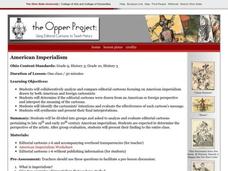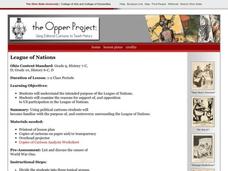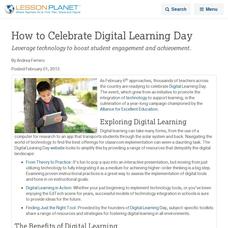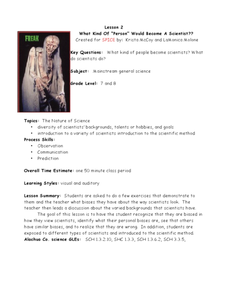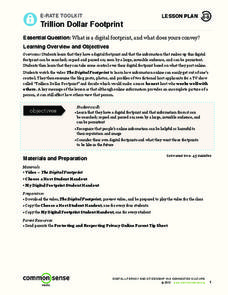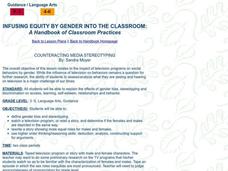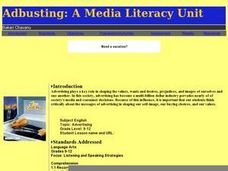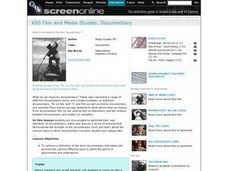Curated OER
American Imperialism
Critical analysis skills can be built in a variety of ways. Using editorial cartoons (both domestic and foreign) learners will consider how American Imperialism was perceived during the late 19th century. Critical thinking questions,...
Curated OER
League of Nations
What is the League of Nations, when did it begin, and what is it's purpose? Young political minds can explore the answers to these questions through political cartoon analysis. Included are several political cartoons, an analysis...
Curated OER
How to Celebrate Digital Learning Day
Leverage technology to boost student engagement and achievement.
Curated OER
Plotting A Hurricane Using latitude and Longitude
Students explore map and plotting skills by tracing the movement s of hurricanes through the Earth's systems. a hurricane map is developed from daily media reports.
Curated OER
Sea Changes: A New England Industry
Young scholars conduct research in order to use primary and secondary sources. They interpret and analyze information from textbooks and nonfiction books for young adults, as well as reference materials, audio and media presentations,...
Curated OER
What Kind of "Person" Would Become a Scientist?
"Scientist Stereotypes" could be another name for this lesson! Begin by drawing from middle schoolers' preconceived notions and media portrayal of scientists, and then explain that anyone can be a scientist. Even though there is an...
Curated OER
Telecommunications and the Whole Language Program
Young writers use technology and other media to research information on a chosen topic. They explore countries where keypals and e-mail friends are located. Using their writing skills, they correspond with their e-mail friend and...
Curated OER
Under the Influence
Students brainstorm on all the ways in which they are reminded of war in their daily lives and reflect on the increasing presence of war references in television entertainment by reading the article, "Beyond the News, Reminders of War."
Facing History and Ourselves
Hands Up, Don't Shoot!
Why is it so difficult to develop a clear understanding of the events surrounding the shooting of Michael Brown by a Ferguson, Missouri, police officer? To answer this question class members listen to a NPR discussion of the findings of...
Common Sense Media
Trillion Dollar Footprint
Learners explore their digital footprints, and discover how information they put online can easily be searched, copied, forwarded, and seen by a large audience.
Florida Center for Reading Research
Phoneme Split and Say
Little ones are provided with all the tools needed to begin segmenting phonemes. There are twenty Elkonin box picture cards, five blank Elkonin box cards, and full instructions on how to help pre-readers practice splitting and saying...
Common Sense Media
Which Me Should I Be?
Impress upon learners the importance of considering how we identify ourselves online, and how this relates to overall considerations of safety and digital wellness.
Visa
Privacy Please: Protecting Your Identity
What are the different ways we are susceptible to identity theft? Impress the importance of protecting personal information and privacy with this resource, which includes an excellent video clip, discussion prompts, and worksheets for...
Common Sense Media
Talking Safely Online
What is the difference between online and real-life friendships? Pupils learn how to keep information private online and maintain their safety in various situations requiring online communication.
College Board
2018 AP® Calculus BC Free-Response Questions
Don't just rely on the textbook. Released items from the AP Calculus BC provide pupils and teachers insight on how topics appear on the exam. The six items are divided into calculator and non-calculator sets with half of them also...
Curated OER
Media Literacy
Pupils watch a video a pre-taped TV commercials. They define propaganda and re-watch the video. Students choose a poster from Posters American Style and journal about their observations. Pupils use the computer lab to develop tape and...
Curated OER
Multi Media "self" Presentation
Students create a three-five minute presentation that visually illustrates major aspects of the their lives. Using Movie Works software as a base, they integrate video, photography, artwork, graphic elements, and sound to produce the...
Curated OER
COUNTERACTING MEDIA STEREOTYPING
Students explore the effects of gender bias, stereotyping, and discrimination.
Curated OER
Adbusting: A Media Literacy Unit
Young scholars examine the ethical issues regarding the role of advertising in our society. They watch a series of ads, analyze the messages of the commercials, and in small groups create a counter-ad.
Curated OER
Media Awareness: Helping a Product Cross the Finish Line
Students develop critical thinking skills to understand and create advertisements. In this journalism instructional activity, students analyze the elements necessary for effective advertisements and work in cooperative groups to...
Curated OER
Symmetrical Mummy Drawings/Mixed Media
Second graders explore Egyptian culture, including mummification, and hieroglyphic writings. They create their own mummy case using paper and a variety of materials. Students use symmetry to create their mummy.
Curated OER
KS5 Film and Media Studies: Documentary
Students generate their own definition of documetary. They watch and discusss a series of extracts that demonstrate the breadth of the documentary form. Students create a defintion of the term documentary that takes into account the...
Curated OER
Massaging the Message: The Media Speaks
Learners watch video of TV news clips centered on the House of Commons and then complete an information sheet.
Florida Center for Reading Research
Phonological Awareness: Phoneme Isolating, Final Phoneme Find
This phonics activity engages listening skills and concentration. Young scholars listen to a teacher-made recording and use the provided worksheet to number the final phonemes they hear.
